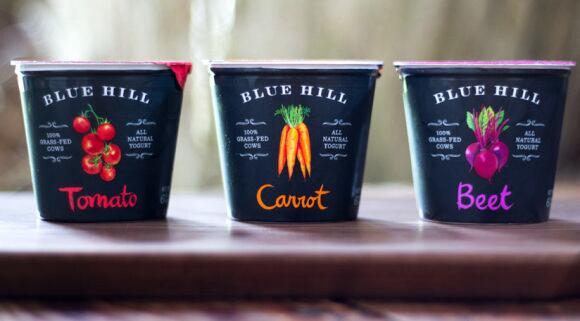The 8oz drinkable yogurts, which will utilize some of the veggie purees used in Blue Hill yogurt pots, plus fruits and a different set of cultures, will have a “sub $5 price point” and should hit the market in January, Blue Hill president David Barber told FoodNavigator-USA.
“We were ahead of the curve with the savory yogurt idea and now we want to take it one step further. We could see on social media that a lot of people are already making their own smoothies with our yogurts using our recipes."
Consumers have become accustomed to drinking veggies in juices and smoothies, while adding fruit to savory yogurt will also make them “more approachable”, he said. “We think we could also gain distribution in places where it might not work to sell the yogurts, although obviously we’d love retailers to carry both.
“We’ve heard from a lot of buyers that think drinkables might be a real sweet spot for this [savory yogurt] idea, and we think a lot of people will pick it up. Velocity is also really important and I think that’s where drinkables will help is as you want something that people will eat every day.”
We’ve heard from buyers that think drinkables might be a real sweet spot for savory yogurt
As for the yogurts, which are now in most Whole Foods regions and other chains from The Fresh Market to Wegmans, encouraging trial remains key, he said, although Blue Hill has learned that “in certain markets and stores they work and in others they just don’t.”
In all cases, encouraging trial is critical, as savory yogurt is still a novel concept for most consumers, he said, so in-store demos have proved very effective: “The issue is velocity. If you can convert four to six people into regular buyers you can earn your shelf space, but demos are expensive and when you’re in 800+ stores, you can’t do this in all of them.”

People are eating them at lunch with a salad, or as an afternoon snack
The yogurts - manufactured by Maple Hill Creamery in New York with milk from 100% grass-fed cows from farms in the Northeast including Blue Hill’s own farm in the Berkshire Hills - come in butternut squash, beet, carrot, tomato, sweet potato, and parsnip variants. Beet and butternut squash are the top sellers, followed by carrot.
Made with 30% or more vegetable puree (whereas most fruit yogurts only contain around 6% fruit puree), the yogurts are blended (no big chunks or carrot or beet) and far less sugary than most yogurts on the market, and also work well as dips, dressings, ingredients, and accompaniments as well as snacks and desserts in their own right, said Barber.
“People are eating them at lunch with a salad, or as an afternoon snack, but it’s really all over the place. From social media we’re also seeing that a lot of kids are eating the product, despite the premium price point.”
The recommended retail price - at $2.39-$2.89 - is at the top end of the category, which is becoming increasingly promotionally driven, he said.
David Barber co-owns Blue Hill with his brother Dan Barber (executive chef), and his wife Laureen (design director).
